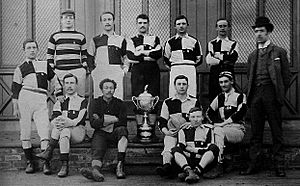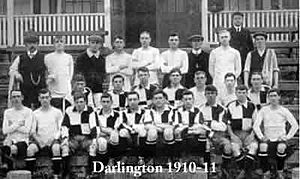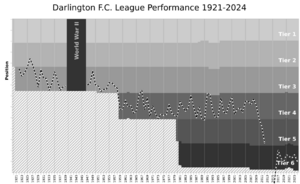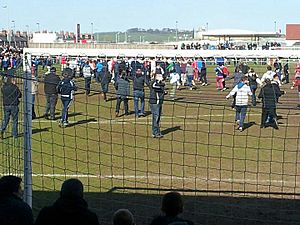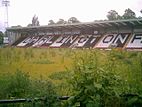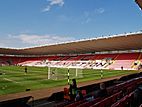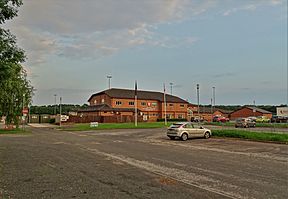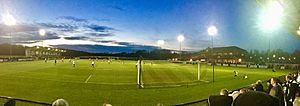Darlington F.C. facts for kids
Darlington Football Club is a football team from Darlington, County Durham, England. As of the 2024-25 season, they play in the National League North, which is the sixth level of English football.
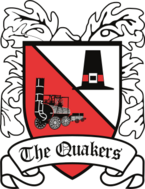 |
||||
| Full name | Darlington Football Club | |||
|---|---|---|---|---|
| Nickname(s) | The Quakers, Darlo | |||
| Founded | 1883 | |||
| Ground | Blackwell Meadows, Darlington | |||
| Capacity | 3,300 | |||
| Coordinates | 54°30′34″N 1°33′51″W / 54.50944°N 1.56417°W | |||
| Major shareholder | Darlington FC Supporters Group | |||
| Manager | Steve Watson | |||
| League | National League North | |||
| 2018–19 | National League North, 16th of 22 | |||
|
||||
The club was started in 1883. They played their games at a stadium called Feethams. Darlington first joined the Northern League in 1889.
They became part of the Football League in 1921. This was when the Third Division North was created. In 1925, they won the Third Division North title. Their highest ever league finish was 15th place in the Second Division in 1926.
Darlington won the Third Division North Cup in 1934. This was their first big cup win. They reached the last 16 of the FA Cup twice. They also made it to the quarter-finals of the League Cup in 1968.
In the early 1990s, they won two titles in a row. They won the Conference National in 1990 and the Fourth Division in 1991. In 2011, they won the FA Trophy. They beat Mansfield Town 1–0 at Wembley Stadium.
In 2003, Darlington moved to a new stadium, the Darlington Arena. It had 25,000 seats. The high cost of this stadium caused the club to face serious financial problems. They went into administration in 2003, 2009, and 2012.
Because of these financial issues, the club was removed from the Football Association (FA). A new club was quickly formed. It moved to the Blackwell Meadows stadium. The FA said the new club had to have a different name. So, they chose Darlington 1883.
This new club started in the Northern League Division One. This was the ninth level of English football, for the 2012–13 season. They earned three promotions in four seasons. After this, the FA allowed them to change back to their original name, Darlington FC.
The team usually wears black and white shirts, black shorts, and black and white socks. The club's badge shows Locomotion No. 1. This is a famous train, showing the town's railway history. It also has a special Quaker hat. This refers to the religious group that influenced the town. This is also where the team's nickname, "The Quakers," comes from. Their main rivals are Hartlepool United.
Contents
Club History
Early Years and First Successes
In 1883, people in Darlington decided to start a new football club. They wanted a strong team to represent the town. Charles Samuel Craven, a local engineer, helped set up the club. Darlington Football Club entered the Durham Challenge Cup in their first season. They won the trophy in 1885.
The next season, Darlington played in the FA Cup for the first time. They lost 8–0 to Grimsby Town. Craven also helped create the Northern League in 1889. Darlington was one of the first teams in this league. They won the league title in 1896 and 1900. They also reached the semi-finals of the FA Amateur Cup in those same years.
The club became professional in 1908. They joined the North Eastern League. In the 1910–11 season, Darlington reached the last 16 of the FA Cup. They won five qualifying rounds before losing to Swindon Town. Two years later, they won the North Eastern League.
After World War I, Darlington finished second in the North Eastern League. The next year, they were champions again. This was good timing. The Northern Section of the Football League's Third Division was forming. Darlington was invited to join.
Their first season in the Third Division was very good. They finished in second place. Three years later, in 1924–25, they won the championship. This meant they were promoted to the Football League Second Division. In 1926, they finished 15th. This is still Darlington's best ever League performance.
However, they were relegated back to the Third Division in 1927. They stayed there until World War II stopped competitive football. They finished as high as third in 1929–30. But they also finished last twice, in 1932–33 and 1936–37. This meant they had to ask to be re-elected to the League.
In 1934, they won their first national cup. They beat Stockport County 4–3 at Old Trafford. This won them the Football League Third Division North Cup. They reached the final again two years later. But they lost 2–1 at home to Chester.
After the War and New Challenges
In November 1955, Darlington played Carlisle United. This was the first FA Cup match between Football League clubs played under floodlights. Darlington won 3–1 in a replay at St James' Park. In the 1957–58 season, they had another great FA Cup run. They beat Chelsea, who were champions three years before. Darlington won the replay 4–1 after extra time.
In the League, Darlington finished fourth in 1948–49. This was their only top-half finish in the first twelve seasons after the war. When the Third Division was reorganized, they were placed in the new Fourth Division.
Fans helped raise £20,000 for ground improvements at Feethams. This paid for a roof and floodlights. The floodlights were first used on September 19, 1960. Later that night, the West Stand burned down due to an electrical problem. Darlington's record attendance was 21,023. This was for a game against Bolton Wanderers in the League Cup two months later.
Under manager Lol Morgan, they won promotion to the Third Division in 1966. A crowd of 16,000 watched them draw against Torquay United. This result made them runners-up. But they were relegated the next year.
Darlington reached the quarter-finals of the 1968 League Cup. They played Brian Clough's Derby County away from home. Darlington took the lead but lost 5–4. In the 1970s, the club had financial difficulties. They had to ask to be re-elected to the League five times. By 1982, they faced a big money crisis. Fans in the town helped raise funds to save the club.
Three years later, they won promotion. They finished third in the league under manager Cyril Knowles. Darlington spent two seasons in the Third Division. Their 13th-place finish in 1986 was their highest since 1958. But they were relegated the next season.
Brian Little became manager in February 1989. It was too late to stop them from being relegated to the Conference. But he then led them to two promotions in a row. They returned to the Football League as Conference champions. Then they won the Fourth Division title in 1990–91.
After Little left for Leicester City, the club was relegated again. They had many different managers in a short time. They almost returned to the Third Division in 1996. They played at Wembley for the first time. But they lost to Plymouth Argyle by one goal.
New Stadium and Club Changes
The 1999–2000 season was the first under chairman George Reynolds. Darlington made history by being the first team to lose an FA Cup game but still qualify for the next round. This happened because Manchester United was in another competition. A "lucky losers" draw was held. Darlington was chosen and lost their third-round game 2–1 to Aston Villa.
Their second Wembley appearance was later that season. They played Peterborough United in the play-off final. Darlington had many chances but lost 1–0.
In 2002, Darlington tried to sign famous players Paul Gascoigne and Faustino Asprilla. In summer 2003, they moved into their new stadium, the Reynolds Arena. Reynolds had paid off the club's debts. But the stadium cost £18 million. It was partly paid for with expensive loans. This led the club into administration six months later.
Reynolds left in January 2004. The club was close to closing down. A special match was played to raise money. Famous footballers like Gascoigne, Bryan Robson, and Kenny Dalglish played. Over 14,000 fans came, raising £100,000 to help the club survive. Despite these problems, the team avoided relegation.
In 2006, the club was sold to property developer George Houghton. For four seasons, Darlington finished in the top half of the table. They reached the play-off semi-final in 2008. But they lost on penalties to Rochdale.
In February 2009, Darlington went into administration again. This meant they lost 10 points automatically. Without this, they would have reached the play-offs. Fans helped raise money to keep the club going. In May, Houghton returned as chairman. He appointed Colin Todd as manager. The club came out of administration. Ownership went to local businessman Raj Singh. This allowed them to play in the 2009–10 season without losing points.
Todd left after losing seven of his first nine games. Steve Staunton replaced him. He only won four of 23 league games. The club was relegated to the Conference. They had more manager changes. Mark Cooper took charge. He led the club to win the 2011 FA Trophy final at Wembley Stadium. They beat Mansfield Town 1–0 with a goal in the last minute of extra time.
Cooper was sacked in October 2011. Two months later, the club went into administration for the third time. Many players left. The remaining staff had their contracts ended. Two days later, fans saved the club from closing down. Enough money was raised to finish the season. But relegation was confirmed with three games left.
Darlington 1883: A New Beginning
On May 3, 2012, a new group called DFC 1883 Ltd took over the club. They wanted the fans to own the club. Because the club couldn't agree on a financial plan, it was removed from the Football Association. The club was eventually closed down.
DFC 1883 Limited immediately started a new club. The FA ruled that this new club had to play in a lower league. It was placed in the Northern League Division One. This was the ninth level of English football. Martin Gray became the manager. The new owners decided to name the club Darlington 1883.
In February 2013, the club became 100% owned by fans and the community. The Darlington Football Club Community Interest Company (DFC CIC) owned 52%. The Supporters' Club held 15%. Individual fans owned the rest. The new owners promised to pay off old debts. Five months later, they made the final payment on taxes owed.
On the field, Darlington won the Northern League Division One in 2012–13. They set a club record with 122 points and scored 145 goals. This earned them promotion to the Northern Premier League Division One North. In 2013–14, they finished second. But they lost in the play-off semi-final.
In 2014–15, Darlington finished second again. This time, they won the play-off final 2–0. This promoted them to the Premier Division. Darlington won their second promotion in a row. They won the 2015–16 Northern Premier League Premier Division title. This happened on April 21, 2016, after beating Whitby Town 7–1.
However, they couldn't get a third promotion in a row. They finished in the play-off spots in the National League North. But they couldn't play in the play-offs because their stadium didn't meet the rules.
Return to Darlington F.C.
In April 2017, the FA approved the club's request. They could change back to the traditional name of Darlington F.C. for the 2017–18 season.
In summer 2017, the club announced work on a new playing area and a new seated stand. This was possible thanks to more fundraising.
In October 2017, Martin Gray left as manager. He joined rivals York City. Former player Tommy Wright took over. Another former player, Alan White, became his assistant. Wright led Darlington to 12th and 16th place finishes. He left in April 2019.
In May 2019, Alun Armstrong became manager. He joined from Blyth Spartans. Assistant Manager Alan White also left. Darren Holloway replaced him a week later.
In Armstrong's first season, Darlington reached the first round of the FA Cup. This was their first time since 2012. They won away games against Trafford, Leamington, and Tamworth. In the first round, they played League Two team Walsall away. The match ended 2–2. Joe Wheatley scored a goal in the 97th minute to get a replay.
Darlington lost the replay 1–0. The game had a record crowd of 3,106 fans at Blackwell Meadows. It was shown on TV.
After finishing 10th in 2019–20, the 2020-21 season was affected by the COVID-19 pandemic. Darlington finished 13th in 2021–22. They were top of the league in January 2023. But they fell to 10th in the 2022–23 season.
The poor results continued into the 2023–24 season. Armstrong was dismissed on September 6, 2023. Josh Gowling replaced Armstrong. But he only lasted three months. He was dismissed after winning only three of sixteen games. The club was second to last in the league.
Steve Watson replaced Gowling. He brought Terry Mitchell with him as assistant manager. They helped Darlington finish 16th. They were 9 points from safety at one point. But they won 10 of their last 15 games. This was called "The Great Escape."
Team Colours and Badge
| Kit suppliers and sponsors | ||
|---|---|---|
| From | Manufacturer | Shirt sponsor |
| 1975 | Umbro | |
| 1976 | Litesome | |
| 1977 | Bukta | |
| 1979 | Le Coq Sportif | |
| 1982 | DONN | |
| 1984 | Hummel | McEwan's |
| 1987 | Hobott | United |
| 1988 | I-S-L | |
| 1989 | Jack Hatfield | |
| 1991 | Hutchison Telecom | |
| 1995 | ICIS | Orange |
| 1996 | Soccerdome | |
| 1997 | On Time Sportswear | Darlington Building Society |
| 1998 | Biemme | |
| 1999 | Xara | |
| 2007 | Vandanel | |
| 2009 | Erreà | |
| 2010 | The Morritt | |
| 2011 | Lakeside Care Homes | |
In 1888, Darlington's kit had black and white striped shirts. They wore black shorts and black socks. Except for a time between the 1910s and 1936 when they wore blue shorts, their home kit colours have always been black and white. The shirt design has changed over time. It has included vertical stripes, hoops, and plain white.
Since the 1980s, sponsors' names have been on Darlington's shirts. The table on the right shows kit makers and shirt sponsors.
The club badge looks like a shield. It is split into two parts. The smaller top right part is white, their home colour. The larger part is red, their traditional away colour. In the white part, there is a special Quaker hat. This shows the important role of the Religious Society of Friends (Quakers) in the town's history.
The larger part shows George Stephenson's Locomotion No 1. This was the steam train that pulled the first train on the Stockton and Darlington Railway in 1825. It represents the railway industry's importance to the area. At the bottom of the shield, a ribbon has the club's nickname, The Quakers. The whole badge sits on oak leaves, which mean strength and endurance.
Stadiums Where Darlington Plays
Feethams was first used by Darlington Cricket Club. But football started being played there in the 1860s. Darlington F.C. began playing there when they formed in 1883. As more fans came, the ground was made bigger. The West stand was built around 1900. The Polam Lane end was added in 1905.
In 1913, two towers were built at the entrance. In 1920, offices and changing rooms were built under the East stand. Floodlights were put in in September 1960. But after their first use, an electrical problem caused a fire that destroyed the West stand. It had to be rebuilt.
In 1997, the East stand was knocked down and rebuilt with all seats. But its cost caused big money problems for the club. George Reynolds took over, paid the debts, and started building a new stadium. The last game at Feethams was a 2–2 draw with Leyton Orient on May 3, 2003. After it closed, the floodlights were sold. The stadium was knocked down. Houses were planned for the land.
The 25,000-seat Reynolds Arena opened in 2003. It cost £18 million. The first game there was a 2–0 loss to Kidderminster Harriers on August 16, 2003. The attendance of 11,600 is still a record for the ground. After Reynolds left, the stadium had different sponsored names. But it is usually called the Darlington Arena.
The number of fans allowed was limited to 10,000. This was due to local rules. But usually, fewer than 3,000 fans came. In 2011, the club's managers put it up for sale. In May 2012, Darlington said they would no longer play at the Arena. Later that year, Darlington Mowden Park R.F.C. bought it.
At first, there were plans for Darlington to share a ground with Shildon. But then, arrangements were made for Darlington to share Bishop Auckland's Heritage Park ground. This started in the 2012/13 season.
In December 2013, it was confirmed that the football team would share Darlington RFC's ground at Blackwell Meadows. This meant they would return to Darlington town. In March 2016, Darlington aimed to move by the start of the 2016/17 season. They planned to increase the capacity to 3,000 seats. This was needed for promotion to the National League.
They played their first game at Blackwell Meadows on December 26, 2016. It was a 3–2 win against F.C. Halifax Town in the National League North. 3,000 fans watched. Darlington made the seated stand at Blackwell Meadows bigger in 2018. It now seats 588 people. This was after fans raised money. This allowed the club to be promoted to the National League.
This stand was built after the 2016–17 season. Darlington finished in the play-off spots that season. But they couldn't play because Blackwell Meadows didn't have enough seats. The club is still looking for ways to make Blackwell Meadows better. This includes a stand at the empty west end of the ground.
As of 2025, Darlington FC is trying to find a place for a new stadium. This would help them earn more money and keep growing.
Fans and Rival Teams
Darlington's fans see Hartlepool United as their main rivals. Hartlepool fans feel the same way. In a 2008 survey, 95% of fans from both clubs said the other was their biggest rival. They have strong competition every time they play each other. The clubs are about 25 miles apart. They had played 147 times in the Football League by 2009–10. Hartlepool won 60 games, and Darlington won 57.
A game between the two clubs in 2007 had 10,121 fans at the Darlington Arena. This was the biggest crowd for that league game in 50 years. However, the average number of fans at the stadium went down. It was over 5,000 in its first season. It dropped to 2,744 in 2009–10.
In the 2012–13 season, Darlington's first season as a renamed club, their main rivals were Spennymoor Town. This was because they were fighting for the Northern League title. Spennymoor Town had won the league for the three years before. But they didn't try for promotion until Darlington joined the league in 2012–13. Spennymoor Town was the only club challenging Darlington for the title near the end of the season.
To a lesser extent, Bishop Auckland were also rivals. This was because they shared a home ground. In the 2014–15 season, Darlington played Spennymoor Town again. Spennymoor had been promoted from the Northern League in 2014. Again, they competed with Darlington for promotion. Darlington won a semi-final play-off match 3–2. The rivalry with Spennymoor started again in 2017–18. Spennymoor reached the National League North. The first game between them ended 1–1 at Blackwell Meadows on August 28, 2017.
The team's mascots have included Mr Q, Darlo Dog (a Dalmatian), and a panda named Feethams. Fans have also created fanzines (fan magazines). These included Mission Impossible and Where's The Money Gone. Since 2013, a fan-run internet radio station, Darlo Fans Radio, has given commentary on Darlington matches.
Darlington had an official supporters' club. There was also an away supporters group called Darlington Away Far Travelling Supporters (DAFTS). They represented Darlington fans from other parts of the country. A supporters' trust was started in 2002. It helped disabled supporters. It also tried to keep a good relationship between the club and its fans. The trust and the supporters' club helped raise money, especially when the club had financial problems.
Team Players
Current Squad
|
|
Players on Loan
|
Club Staff
Boardroom Members
| Position | Name |
|---|---|
| Chairman / CEO | David Johnston |
| Director / Company secretary | Jonathan Jowett |
| Director | John Vickerman |
| Director | Chris Stockdale |
| Director | Darlington 1883 Supporters Society Limited (Jon Saddington) |
Football Staff
| Position | Name |
|---|---|
| Manager | Steve Watson |
| Assistant Manager | Terry Mitchell |
| Physiotherapist | Nathan Liddle |
| S&C Coach and Physiotherapist | Luke Roberts |
| Goalkeeping Coach | Steven Rodden |
| Head Analyst | Alex Jenkins |
| First Team Analyst | Jamie Lauder |
| Kit Manager | Gary Smith |
| Assistant Kit Manager | Zak Dunne |
Reserve Team and Youth Development
In October 2016, Horden Colliery Welfare moved to Darlington. They became the reserve team for Darlington. They changed their name to Darlington 1883 Reserves. They played on a special 4G pitch at Eastbourne Sports Complex. Horden's chairman said the club would have closed without this move. Darlington kept some of Horden's players and staff. They took Horden's place in the Wearside League. Their first game under the new name was on October 6. They lost 1–0 away.
In June 2024, Darlington announced they would form an Under 23s team. This team would continue the work of Grant Cuthbertson and John Walters' U18s team. That U18s team won 3 county cups in a row. The U23s team would join the Wearside League Division Three. Many players moved up from the U18s to the U23s during the 2024-25 season. These included Matthew Kirokiro and Will Maddison.
Club Achievements
Here are some of the awards and titles Darlington has won since 1883:
League Titles
- Third Division North (level 3)
- Champions: 1924–25
- Runners-up: 1921–22
- Fourth Division (level 4)
- Champions: 1990–91
- Runners-up: 1965–66
- Promoted: 1984–85
- Football Conference (level 5)
- Champions: 1989–90
- Northern Premier League Premier Division (level 7)
- Champions: 2015–16
- Northern Premier League Division One North (level 8)
- Runners-up and play-off winners: 2014–15
- Runners-up: 2013–14
- Northern League
- Champions: 1895–96, 1899–1900, 2012–13
- Runners-up: 1896–97, 1898–99
- North Eastern League
- Champions: 1912–13, 1920–21
- Runners-up: 1919–20
Cup Wins
- FA Trophy
- Winners: 2010–11
- Football League Third Division North Cup
- Winners: 1933–34
- Runners-up: 1935–36
- Durham Challenge Cup
- Winners: 1884–85, 1890–91, 1892–93, 1896–97, 1919–20, 1999–2000
Club Records
Darlington's best league finish was 15th place. This was in the Football League Second Division during the 1925–26 season.
The club's best performance in the FA Cup was reaching the last 16 twice. The first time was in 1910–11. They lost to Swindon Town. The second time was in the 1957–58 season. They beat Chelsea 4–1 in a replay. Then they lost 6–1 to Wolverhampton Wanderers.
The club's best League Cup performance was reaching the quarter-final. This was in the 1967–68 season.
The Quakers' biggest home win was 13–1 against Scarborough. This was in the FA Cup on October 24, 1891. Their best away win in the Football League was 7–3. They beat Durham City in the Third Division North on October 22, 1921. They also had 7–1 wins in the Northern League Division One. These were against Billingham Town in October 2012 and Hebburn Town in February 2013. They also won 7–1 against Whitby Town in the Northern Premier League in April 2016.
The player with the most league games for Darlington is Ron Greener. He played 439 games between 1955 and 1967. He played a total of 490 senior games for the club. Alan Walsh scored a club record 87 league goals. He played from 1978 to 1984. He scored 100 goals for Darlington overall. The most league goals scored by one player in a season is 39. This was by David Brown in the 1924–25 season. Franz Burgmeier played the most international games while a Darlington player. He had seven caps for Liechtenstein in the 2008–09 season.
Dream Team
In 2003, for the "Farewell to Feethams" celebrations, fans voted for an all-time "Dream Team." The players chosen were: Mark Prudhoe, Ron Greener, Craig Liddle, Kevan Smith, John Peverell, Andy Toman, David McLean, Alan Sproates, Alan Walsh, Marco Gabbiadini, and Colin Sinclair. Fans voted Gabbiadini as the greatest player ever. He scored 53 goals in his two seasons at Darlington.
See also
 In Spanish: Darlington Football Club para niños
In Spanish: Darlington Football Club para niños
 | Georgia Louise Harris Brown |
 | Julian Abele |
 | Norma Merrick Sklarek |
 | William Sidney Pittman |


